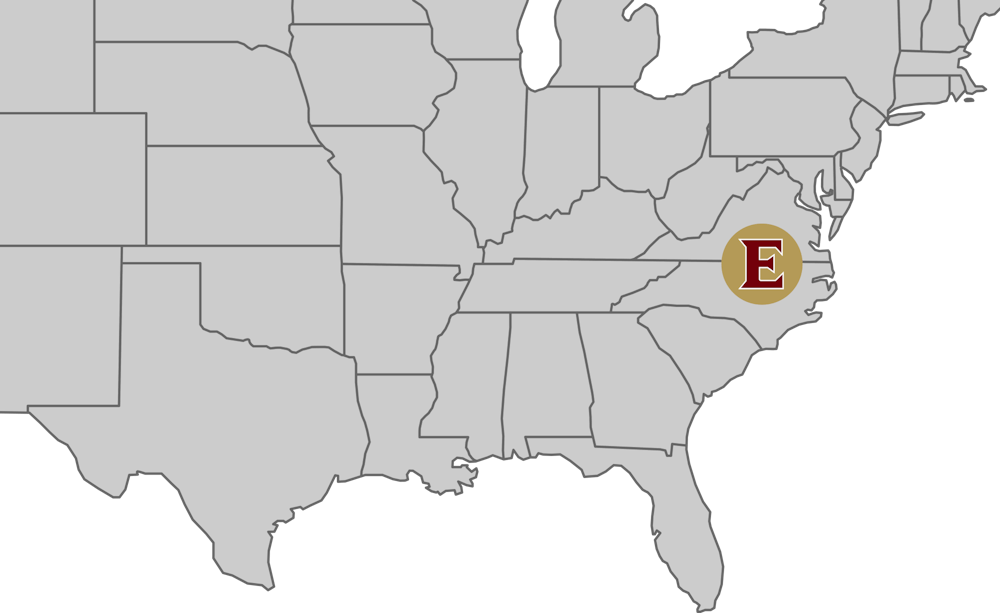CORRECTION: A previous version of this article incorrectly described Elon students' median household income as the average. Elon News Network regrets this error.
You rarely hear a southern accent around the Moseley Student Center or Alamance Building. If a drawl echoes, it’s usually a campus employee. Each time there is an accent, I think of growing up in the South and feel that mix of dread and nostalgia.
Time in the South gets you acquainted with those two feelings. The South is both a good memory and a bad one. That is the Southern experience.
Once I heard a friend say, “I know about the South, I go to Elon.” As a South Carolinian, that phrase struck me as a little strange. I crunched some numbers.
Elon pulls a lot of its undergraduates from the South. Around 46% come from what AP designates as a Southern state, according to Elon’s Registrar Report. However, our sense of reality is different. We pull from a very narrow brand of student. Wealth isolates less privileged Southern communities from the Elon experience. The heart of the South is missing.
The Elon student’s median household income is $208,300, according to data from Opportunity Insights. The median household income in Alamance County is $53,220, according to The Alamance Chamber of Commerce. From a distance, Elon sticks out like a strange rich acropolis in North Carolina’s Piedmont.
Elon has partially alienated itself from Alamance County. Elon doesn’t pull from the heart of those communities. Many students come to Elon, just to leave and go to Europe, because of its nationally renowned study abroad program. What is true with every university is especially true with Elon. People come here often to leave.
North Carolina universities are caught at the point between wealth and authenticity. High Point University has a private steakhouse on campus and a median household income of $161,600. At $221,500 a year, Wake Forest has the 11th highest median parent income out of all American Colleges, according to data from Opportunity Insights. Elon's parents are the 18th most affluent in America. We have resources because of it, but part of the South is missing.
The South’s heart has a legacy of racial scars. The first sit-in was in Greensboro. North Carolina’s piedmont held some of the sparks that lit the Civil Rights movement. Each southern battleground carries a well of generational pain. Alamance County is 22.3% Black, according to census data. Elon’s undergraduate class is 5.3% Black, according to Elon’s diversity dashboard.
I think that it is fair to say the Elon experience is not the Southern experience. It is a mix between Lululemon, Massachusetts and barbeque. This strange mix can be refreshing. We create a little culture of our own, but it is a little too perfect. It is a brick playground that shuns the weight and serious questions that come from time in the South.
The South has the most scars and the least wealth. Elon tries to keep itself perfect. The jovial cultural aspects of the South are missing too, our dining halls serve international food more often than Southern food. The South is one of the embattled hearts of America. How can we learn considering these deep cultural and racial wounds? We have to pull from the communities around us. If we don’t, the communities will be more indifferent.
When parents and their children flocked to afternoon parties on Phoenix Friday, a popular time for families of prospective Elon students to visit. Many wore cowboy boots and floral dresses which had the aesthetic of an Ole Miss football game. I’m here for it, but it just felt off. We don’t wrangle cattle out here.
Elon has a problem with school spirit – but also local spirit. An argument could be made that it is because Elon is not a tailgating, gameday school. That may be partially true, but part of Elon’s spirit problem comes from its lack of investment in regional community. Even the Elon-themed clothes wear thin in shops past Greensboro. You can walk into virtually any Target in North Carolina and find University of North Carolina, Chapel Hill and Wake Forest University merchandise.
Elon needs to turn its gaze further inward. As I look around Elon, I see somewhere wiped clean of its roots. When I think of Elon’s values, I think of its past. A great fire brought this past robbed of history. And what takes the place of history? At Elon, expansion takes the place of where the roots once were.
That restless expansion is part of Elon’s soul. Elon should try to be a Southern university and not a wealth-centered university that happens to be in the South. Elon would gain more strength in its image by integrating more of the weight of the South. This includes the social and racial weight.
We have the wealth at Elon, but do we have the weight? The Southern experience is not a sunny day in Young Commons, or shining Teslas parked in student lots. It is the mix of a good memory and a bad one, just like any true memory.


